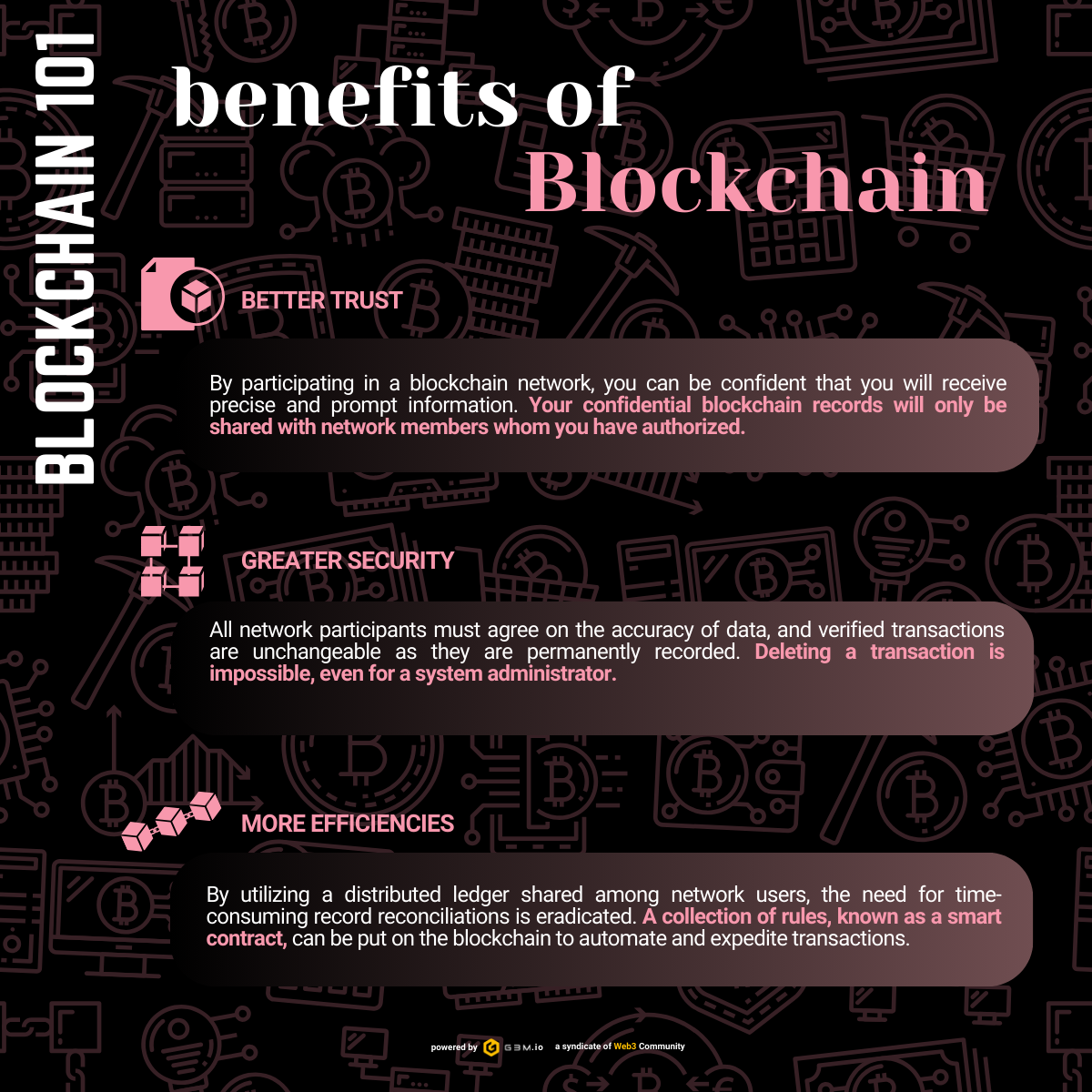Benefits of Blockchain
3 min read - February 23 by Admin
Blockchain 101
Web3

In today's increasingly digital world, trust, security, and efficiency are paramount. Blockchain technology emerges as a game-changer, offering a unique set of benefits that are transforming various industries. Let's delve into three key advantages of blockchain and explore how they are shaping a better future:
1. Building Trust Through Transparency and Access Control
Imagine a network where everyone has access to the same information, and its accuracy is guaranteed. This is the essence of blockchain's enhanced trust. Unlike traditional systems where data can be opaque and controlled by central authorities, blockchain operates as a member-only network. This ensures:
- Data Accuracy and Timeliness: Every member on the network participates in validating transactions, fostering a collective responsibility for data integrity.
- Controlled Access: You have complete control over who can access your confidential information. Access is granted only to specific members you authorize, preventing unauthorized data sharing.
Example: In the healthcare industry, blockchain can securely store patient medical records. Patients can control who has access to their data, while healthcare providers can access accurate and up-to-date information, fostering trust and improving collaboration. (Source: [IBM, "Blockchain for Healthcare: A Guide to Understanding the Technology and its Potential Impact" (2020)])
2. Unbreakable Security: Immutability and Consensus
Security breaches and data manipulation are constant concerns in the digital age. Blockchain addresses these concerns head-on with its unbreakable security features:
- Immutable Records: Once a transaction is validated and added to the blockchain, it becomes permanent and tamper-proof. No one, not even system administrators, can alter or delete the record. This ensures data integrity and prevents fraudulent activities.
- Consensus Mechanism: Every transaction undergoes a rigorous validation process where all network members must agree on its accuracy. This distributed approach eliminates single points of failure and minimizes the risk of unauthorized modifications.
Example: In supply chain management, blockchain can track the movement of goods from origin to destination. Each step of the journey is recorded immutably on the blockchain, providing transparency and preventing counterfeiting. This enhances security and builds trust between all stakeholders involved. (Source: [World Economic Forum, "TradeTech: A New Trade Paradigm for the 21st Century" (2018)])
3. Streamlining Processes: Efficiency Through Automation
Manual processes can be time-consuming and prone to errors. Blockchain tackles this challenge by offering increased efficiency:
- Eliminating Reconciliation: With a shared ledger accessible to all members, the need for time-consuming reconciliation of records is eliminated. This streamlines workflows and reduces administrative burdens.
- Smart Contracts: These self-executing agreements automate specific tasks and transactions when predetermined conditions are met. This eliminates manual intervention, reduces processing times, and minimizes the risk of human error.
Example: In the financial sector, smart contracts can automate loan approvals and payments once specific criteria are fulfilled. This eliminates manual paperwork, expedites transactions, and reduces processing costs. (Source: [Accenture, "Unlocking the Value of Blockchain: A Practical Guide for Business" (2019)])
Conclusion:
Blockchain's unique combination of enhanced trust, unbreakable security, and increased efficiency paves the way for a more secure, transparent, and efficient future. As its adoption continues to grow across various industries, we can expect to see even more innovative applications emerge, shaping a future built on collaboration and trust in the digital world.
* #web3 * #blockchain * #crypto * #cryptocurrency * #decentralization * #defi * #nft * #metaverse * #web3investing * #web3incubation * #web3startup * #futureofweb3